Is Watermelon Good for You? 15 Science-Backed Effects of Eating It
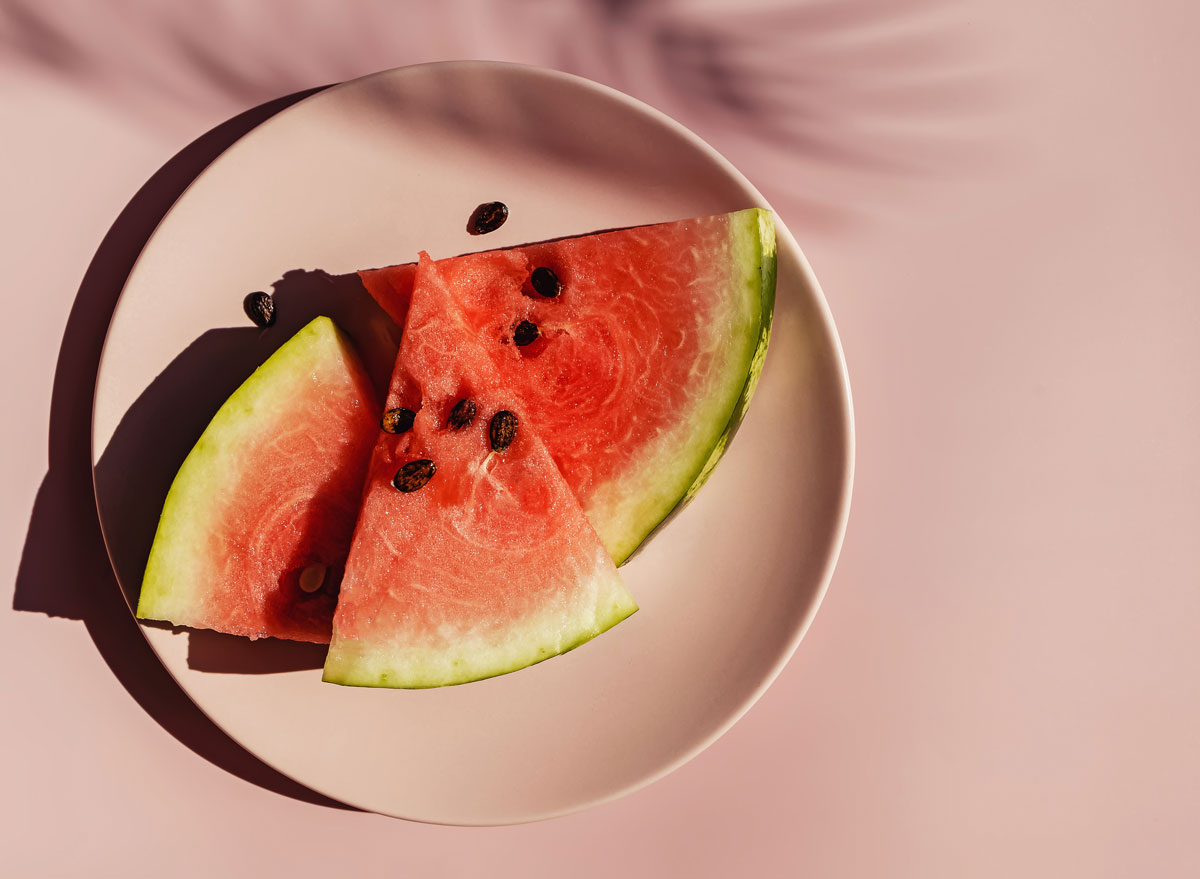
The unofficial kickoff of peak watermelon season is in full swing, making it the ideal time of the year to load up on these magnanimous, sweet, ultra-hydrating melons. As nature’s candy, all melons bring their own nutrition-packed power to the table. Watermelons are loaded with antioxidants, vitamins A and C, and a slew of other nutrients, and what makes them especially unique is that this sweet treat is actually a low-sugar fruit when compared cup-for-cup to other tropical fruits. (In fact, a single cup of cubed watermelon is only a meager 9 grams of sugar!)
While the light texture of watermelon, coupled with its low-caloric appeal, may make it an easy snack to indulge in, we all know that moderation is key to a healthy lifestyle, and having too much of a good thing generally comes with some form of consequence. So, is watermelon good for you?
To find out, we decided to analyze some of the benefits and side effects that have been scientifically linked to eating watermelon. Read on to learn what could potentially happen when you eat your fill of this sweet summertime fruit—and for more info on another refreshing, vitamin C-rich variety of nature’s candy, be sure to check out 7 Surprising Benefits of Eating Grapefruit, According to Dietitians.
A Look at Watermelon’s Nutrition Info
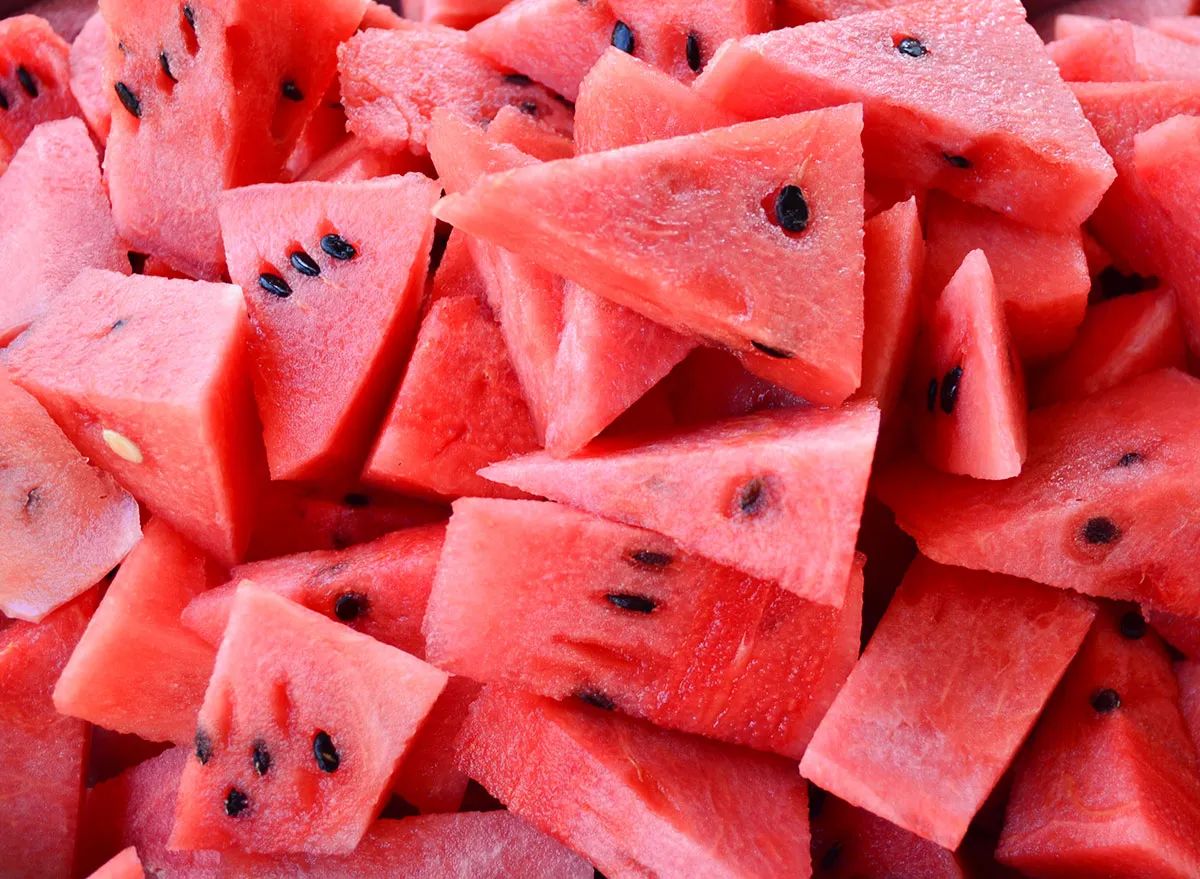
According to the USDA, one wedge of watermelon (or roughly 286 grams) will juice up your body with:
- 85.8 calories
- 1.7 grams protein
- 0.4 grams fat
- 21.6 grams carbs
- 1.4 grams fiber
- 17.7 grams sugar
- 80.1 milligrams vitamin A (9% DV)
- 23.2 milligrams vitamin C (26% DV)
- 0.13 milligrams vitamin B6 (8% DV)
- 320 milligrams of potassium (7% DV)
Yet, beyond watermelon’s nutritional composition and all the possible health benefits which stem from it, eating watermelon can potentially result in a few side effects—some of which may even surprise you! To understand the benefits of eating watermelon—while also keeping you in the know about some of the potential side effects of this fruit—let’s take a deep dive into the science behind what can happen to your body when you eat watermelon.
12 Benefits of Eating Watermelon
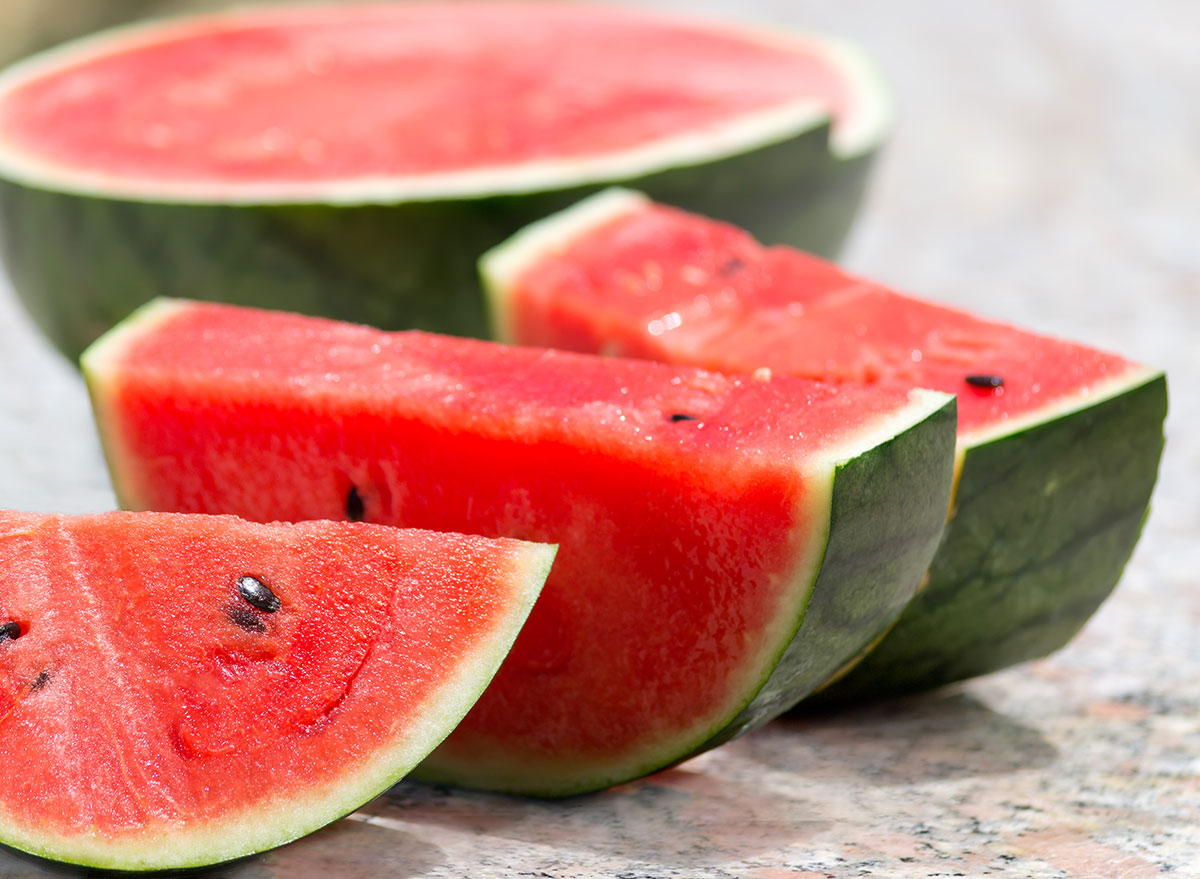
Juicy watermelon not only serves as a refreshing, sweet snack but also packs a host of health benefits. From hydration to blood pressure management, here are 12 ways that indulging in this melon can support your overall well-being.
1. Watermelon can boost your immune health.
Accounting for over 25% of your daily value of vitamin C, watermelon’s propensity to fortify your immune system is undeniably impeccable. Many studies have linked this essential vitamin to quality immune defense. In the case of fruit, in particular, research suggests that getting your vitamin C intake via nature’s candy can help to promote collagen production, which is critical to supporting cell structure and immune health.
2. You’ll get a boost of hydration
When it comes to foods that can provide your body with hydration, watermelon stands (or grows) head and shoulders above the rest. Comprised of 92% water, it’s one of the highest-water-content foods on the planet. Keeping hydrated is essential to the healthy functionality of all your bodily functions; it prevents fatigue and sustains your energy, mitigates headaches, aids in flushing waste from the body, and improves skin tone and elasticity to help you retain your youthful good looks. So the next time you’re desperate to quench your thirst on a hot day but also want to hit your tastebuds with a zap of sweetness, consider cracking open a juicy watermelon!
3. You’ll have a better post-workout recovery.
One challenge to sticking with a consistent exercise schedule is anticipating the aches and pains that can soon follow after a hard workout, especially if you’re getting back into a physical fitness groove after a temporary hiatus. Although people may say “no pain, no gain,” I think we can all agree that a little less pain post-workout would certainly make exercise a more enjoyable experience—enter watermelon. One small 2013 study published in the Journal of Agricultural and Food Chemistry revealed that athletes who drank watermelon juice amid exercise reported less soreness and slower heart rate 24 hours after working out. Researchers attribute this outcome to watermelon’s L-citrulline content, an organic amino acid that enables your arteries to relax and improve blood flow.
4. It may help neutralize cancer cells.
Watermelon is high in antioxidants that help neutralize free radicals in the body, and left unchecked, free radicals have the ability to form cancer cells. But how does watermelon have the ability to do this? Well, much like other red-colored summertime fruit favorites (we’re looking at you, tomatoes), watermelon contains high amounts of lycopene, a potent antioxidant with cancer-preventive properties. Antioxidants like lycopene help fight cancer, promote anti-aging, and repair damaged cells in the body. While tomatoes may take all the credit for providing a good source of lycopene, watermelon actually provides nearly 40% more lycopene than raw tomatoes!
Scientists have proposed that lycopene might protect against DNA damage, stop cancer cell growth, and boost enzymes that break down cancer-causing products, according to Memorial Sloan Kettering Cancer Center. In fact, a clinical trial published in the International Journal of Molecular Sciences suggested that lycopene supplements may reduce the spread of localized prostate cancer.
5. It may protect your eyesight.
Carotenoids like lycopene are associated with decreased risk of macular degeneration, an age-related wearing down of the retina that’s a leading cause of vision loss in people over age 60. Watermelon is rich in both lycopene and vitamin C, another powerful antioxidant that’s good for your vision. In the landmark Age-Related Eye Disease Study of 5,000 people ages 55 to 89, researchers found that people with moderate macular degeneration slowed the progression of the disease after taking daily supplements containing beta-carotene, vitamin C, vitamin E, and zinc.
6. It improves satiety.
Satiety is the feeling of fullness and satisfaction after a meal. Finding foods that enhance satiety are a recipe for success when trying to pay attention to portion size. Feeling satiated makes eating proper portions easier. One important contributing factor to satiety is the total volume of food consumed. Thus, being able to eat a greater quantity gives one the sensation of fullness. Watermelon offers this benefit due to its high water content. In other words, since the fruit is quite juicy, you can eat more of it for lower total calories when compared to other fruits.
7. It may lower your blood pressure.
Let’s break this down a bit: According to the USDA, a cup of watermelon chunks contains 170 milligrams of potassium. This essential electrolyte and mineral is helpful for lessening the effects of sodium on blood pressure and is also important for proper nervous system function, according to the Mayo Clinic. And in fact, a small study of 13 middle-aged obese men and women with hypertension at Florida State University found that watermelon could reduce blood pressure both at rest and while people were under stress. “The pressure on the aorta and on the heart decreased after consuming watermelon extract,” said associate professor Arturo Figueroa, author of the study, which was published in the American Journal of Hypertension.
8. It can help manage weight and even support weight loss.
Eating chunks of fresh watermelon as an appetizer or in a salad also could be a useful weight-loss strategy, according to a 2019 study published in the journal Nutrients.
The study involved 33 overweight or obese men and women who were instructed to eat 2 cups of fresh diced watermelon daily for four weeks. During a separate four-week period, the participants were asked to eat a low-calorie cookie snack daily consisting of the same number of calories as the watermelon snack. The subjects ate and exercised normally.
At the conclusion of the test, those in the watermelon group reported higher satiety ratings than the cookie group, claiming that the desire to eat was significantly reduced for up to 90 minutes after consuming watermelon. Meanwhile, hunger levels didn’t change after eating the cookies. The researchers also found that participants lost weight after four weeks of snacking on watermelon and gained after the low-fat cookie intervention. The waist-to-hip ratio also was lower at week four of the watermelon snacking compared with the same week of cookie eating.
9. The seeds make for a great snack.
Don’t believe the long-standing myth—swallowing watermelon seeds won’t sprout vines in your bowels. In fact, watermelon seeds are nutritious—and tasty; roast them the way you would pumpkin seeds. A “Comprehensive Review on Watermelon Seed—The Spitted One” from the International Journal of Current Research declares that the watermelon’s “neglected food parts” are quite valuable as a food source, rich in protein, magnesium, iron, zinc, and monounsaturated “good” fats. Sprinkle with a little olive oil over the seeds and roast them on a baking pan in an oven set at 350 degrees F for 15 minutes, turning halfway through. When crispy, dust with cinnamon, chili powder, or Old Bay.
10. It could improve your libido.
A 2008 press release from Texas A&M University about a study done there made worldwide news when a researcher suggested a particular beneficial function of the phytonutrient citrulline, which is found abundant in watermelon—better blood flow. When you eat watermelon, enzymes in your body convert citrulline into arginine, an amino acid that’s good for the heart and circulatory system because it relaxes blood vessels, making them more pliable. Good blood flow is critical to arousal in men and women. But you would have to consume a lot of watermelon to, in theory, enjoy the benefits of an arginine boost. Lots and lots of watermelon. Another study published in Nutrition found that it took drinking three to six eight-ounce glasses of watermelon juice per day for three weeks to elevate volunteers’ blood levels of arginine by 12% to 22%.
11. It promotes heart health.
A compound in watermelon has been shown to reduce levels of cholesterol and decrease the amount of artery-clogging plaque in a study conducted by researchers from Purdue University and University of Kentucky in 2014. In the experiment, researchers fed two groups of mice a diet high in saturated fat and cholesterol. The researchers gave one group water containing watermelon juice and the other group water containing a solution that matched the carbohydrate content of the watermelon juice. The mice that drank the watermelon juice ended up with 50% less LDL, the so-called “bad” cholesterol, in their blood and also saw a 50% reduction in plaque in their arteries. What’s more, the experimental group of mice gained 30% less weight than the control group did. The researchers suggest that citrulline, a compound in watermelon, may be responsible for the positive outcome.
12. It may help prevent asthma.
Watermelon and other fruits and vegetables that are rich in vitamin C may fight the inflammatory free radicals that some experts believe trigger the development of asthma. A meta-analysis in the journal Nutrients found six of seven studies suggesting that higher fruit and vegetable consumption may offer a protective effect against lung inflammation and asthma.
3 Potentially Negative Side Effects of Eating Watermelon
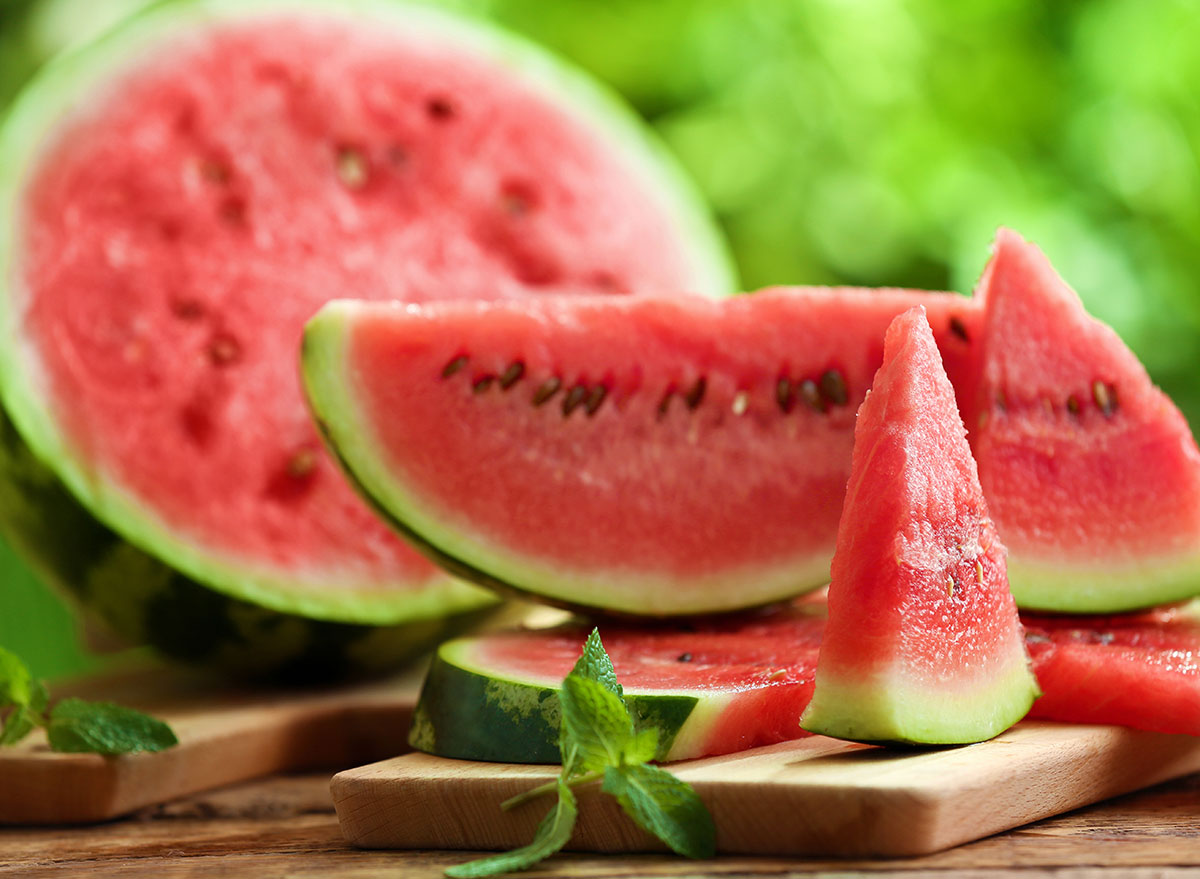
While there are benefits to eating this pink fruit, there are also a few downsides worth mentioning.
1. Watermelon may give certain people gas, diarrhea, or other digestive issues
Watermelon is high in fructose, which is a plant compound in the FODMAPs category. People with a history of digestive issues, such as irritable bowel syndrome (IBS), may need to limit FODMAPs in order to feel their best. Not everyone is susceptible to FODMAPs, and experimenting with an elimination protocol may work for you if you suspect watermelon contributes to your tummy troubles! However, on the flip side, much like apples and pears, watermelon is pretty high in fructose and can cause abdominal discomfort, gas, and diarrhea—especially if you have bowel sensitivity or gorge on a whole bunch of it.
2. It may raise your blood sugar—but not by much.
Watermelon is sweet because it contains fructose (fruit sugar)—about 17 grams per slice. If you eat a couple of slices, it may slightly raise your blood sugar, which may be a concern if you have prediabetes or diabetes.
Because of its high-water content, watermelon has a low glycemic load (GL) of 2 per 100-gram serving, which is generally considered a more useful way to look at the impact of foods on blood sugar. While the “glycemic index” (GI) represents how fast sugar enters the bloodstream, GL indicates how high a specific food might raise blood sugar levels, and a high GL is anything 19 and above.
According to the American Diabetes Association, as long as you eat watermelon in healthy moderation—and consume this in conjunction with an overall well-balanced diet of fats, proteins, fiber, and other carbohydrates—this melon can be safe to eat, even if you have type 2 diabetes.
3. It may trigger migraines in those prone to migraines.
A 2021 study on migraine triggers published in the Postgraduate Medical Journal found that watermelon might be more triggering than other fruits. Researchers reviewed a variety of fruits, including watermelon, passion fruit, orange, pineapple, grape, banana, cucumber, and papaya. Yet, the study showed watermelon was associated with far more incidence of migraines—sometimes within minutes of consuming the fruit! Nearly 30% of participants experienced migraines within roughly 90 minutes of consuming watermelon!
Is watermelon good for you?
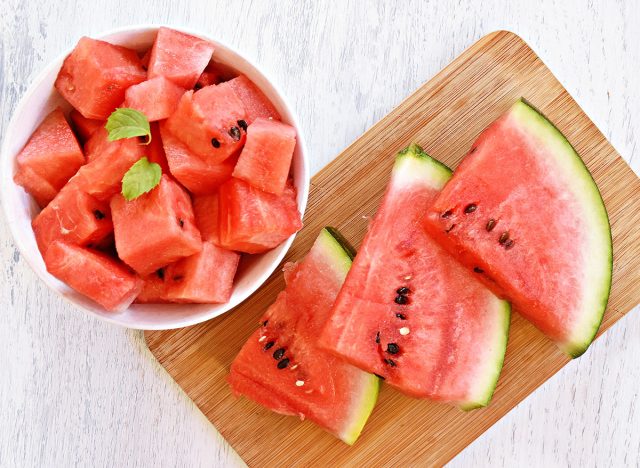
In light of the scientific evidence, watermelon is good for you. This juicy fruit is a good source of essential vitamins and boasts several proven health benefits, from hydration to heart health support. It’s important to be mindful of its high sugar content, particularly for individuals with diabetes, but many of its blood sugar-raising effects can be mitigated if consumed in moderation.
A previous version of this article was originally published on July 12, 2021. It has since been updated to include additional copy and proofreading revisions, further research, and updated contextual links.
- Source: https://fdc.nal.usda.gov/fdc-app.html#/food-details/167765/nutrients
- Source: https://ods.od.nih.gov/factsheets/VitaminC-HealthProfessional/
- Source: https://www.ncbi.nlm.nih.gov/pmc/articles/PMC6353827/
- Source: https://www.mayoclinic.org/healthy-lifestyle/nutrition-and-healthy-eating/in-depth/water/art-20044256?p=1
- Source: https://www.ncbi.nlm.nih.gov/pmc/articles/PMC6073798/
- Source: https://www.ncbi.nlm.nih.gov/pmc/articles/PMC1473211/
- Source: https://clinicaltrials.gov/ct2/show/NCT03380221
- Source: https://fdc.nal.usda.gov/fdc-app.html#/food-details/167765/nutrients
- Source: https://www.mayoclinic.org/diseases-conditions/high-blood-pressure/in-depth/high-blood-pressure/art-20046974
- Source: https://academic.oup.com/ajh/article/27/7/899/2743182
- Source: https://www.ncbi.nlm.nih.gov/pmc/articles/PMC6470521/
- Source: https://www.journalcra.com/article/comprehensive-review-watermelon-seed-%E2%80%93-spitted-one
- Source: https://www.sciencedaily.com/releases/2008/06/080630165707.htm
- Source: https://pubmed.ncbi.nlm.nih.gov/17352962/
- Source: https://www.purdue.edu/newsroom/releases/2012/Q4/watermelon-shown-to-boost-heart-health,-control-weight-gain-in-mice.html
- Source: https://onlinelibrary.wiley.com/doi/full/10.1111/j.1440-1746.2009.06149.x
- Source: https://pubmed.ncbi.nlm.nih.gov/24892470/
- Source: https://www.health.harvard.edu/diseases-and-conditions/the-lowdown-on-glycemic-index-and-glycemic-load
- Source: https://pubmed.ncbi.nlm.nih.gov/33892616/









